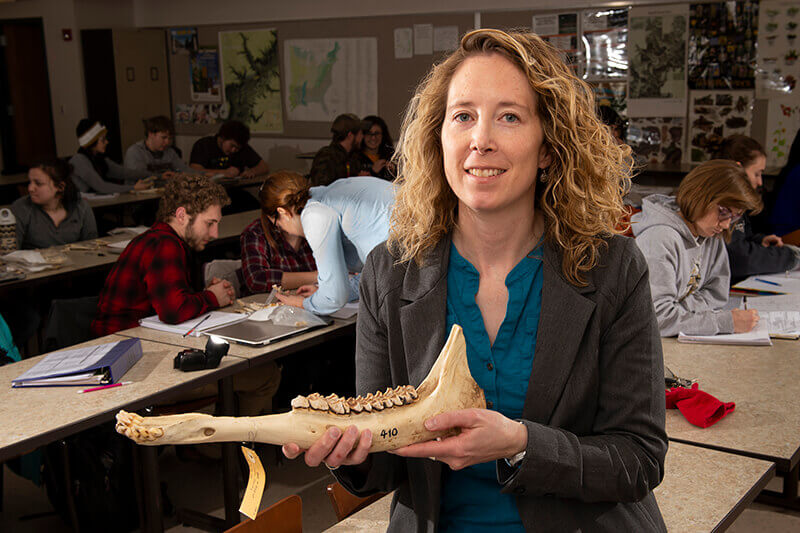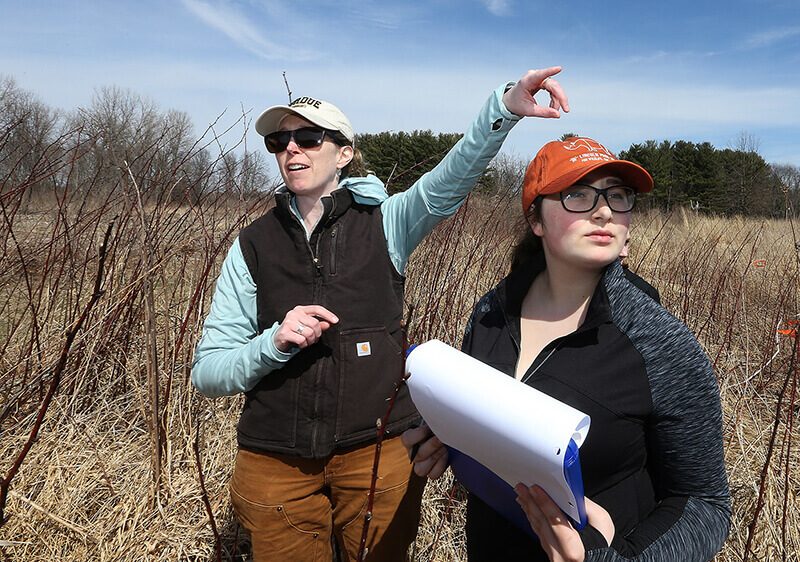May 4, 2020
Murphy Award winner: Elizabeth Flaherty

Elizabeth Flaherty, associate professor in the Department of Forestry and Natural Resources. (Purdue University photo/John Underwood)
Note: The profile below is part of Purdue Today's ongoing series on Purdue's winners of the 2020 Outstanding Undergraduate Teaching Award in Memory of Charles B. Murphy, Exceptional Early Career Award and Excellence in Instruction Award for Lecturers.
Students in Elizabeth Flaherty’s Wildlife Investigational Techniques class, typically, live trap rabbits in the field, study vegetation that they eat, and then write about it. That persistent focus on active learning while teaching in Purdue’s Department of Forestry and Natural Resources has earned Flaherty high praise from students, and a 2020 Murphy Award.
For seven years, Flaherty has taught courses on wildlife habitat management, wildlife investigational techniques, forest habitats and teaching natural resources at the undergraduate level.
“I want to teach students the necessary content as well as the professional skills that they will need for the future,” Flaherty says. “I want to help develop and train natural resources professionals that have the communication, analytical, and intercultural competency skills that will lead to a successful and productive career.”
Flaherty’s teaching has earned several honors. In 2018, she received the North American Colleges and Teachers of Agriculture Teacher Educator Award, and in 2017 she won the Innovative Teaching Award from the Association of Public and Land-grant Universities. She received the Richard L. Kohls Award from Purdue’s College of Agriculture in 2019 and in the same year she received a Teaching Leadership Award from Purdue.
 Elizabeth Flaherty, associate professor of forestry and natural resources, works with Annaliese Ford and other students on vegetation surveys at the Purdue Wildlife Area in March 2019. (Purdue University photo/Tom Campbell)
Download image
Elizabeth Flaherty, associate professor of forestry and natural resources, works with Annaliese Ford and other students on vegetation surveys at the Purdue Wildlife Area in March 2019. (Purdue University photo/Tom Campbell)
Download image
Students consistently praise Flaherty, who was an IMPACT (Instruction Matters: Purdue Academic Course Transformation) fellow in spring 2016, on teaching evaluations. They like her emphasis on writing, which includes summaries of lab work and weekly assignments in courses like Wildlife Investigational Techniques. Students also must work with each other to develop a management plans in Wildlife Habitat Management.
On student says, “This class was extremely helpful and I learned so much. The weekly essays were a lot of work, but they were worth it to gain the skills necessary to write a scientific paper. We learned skills in the field, writing, and using Excel; and combining all of those skills was very useful. We were always encouraged to participate and give the class our all.”
Flaherty, who also trains undergraduate teaching assistants, concentrates on active and inquiry-based learning.
“In lab, students are often outside learning how to collect data and use the tools of the trade or are in a computer lab learning how to analyze their data,” Flaherty says. “In lecture, I use small group discussions, case studies, jigsaw activities, and other forms of active learning to provide students with an opportunity to use the information that they’re learning. In my fall Wildlife Habitat Management course, I use the same forms of active learning in lecture and the students also work in lab in small groups.”
She says that teaching her courses online due to the COVID-19 crisis has been challenging, at times.
“My spring course is Wildlife Investigational Techniques, and it is a very hands-on course with weekly labs taught either outside or in a computer lab,” she says. “I was able to provide students with data, and we worked on the data analysis portion remotely, but they missed out on the other activities because there is no easy way to teach those hands-on techniques online.”
Flaherty also has co-led two spring study abroad courses to Cuba and another to Ecuador and the Galapagos Islands. She is the faculty advisor for Purdue’s student chapter of The Wildlife Society, and at the society’s 2019 annual conference in Reno, Nevada, the chapter’s quiz bowl team won the national championship.
Writer: Greg McClure, gmcclure@purdue.edu

